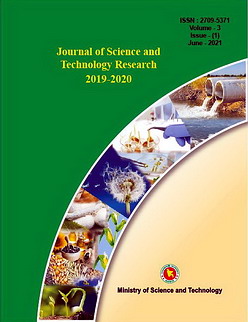Detection of Clinically Relevant Genetic Variants in Children with Autism Spectrum Disorder by Whole Exome Sequencing
DOI:
https://doi.org/10.3329/jscitr.v3i1.62806Keywords:
Autism spectrum disorder neurodevelopment disorder; Whole exome sequencing; genetic variantsAbstract
Autism spectrum disorder (ASD) is a neurodevelopment disorder which is related with a good number of genetic mutations. There is a lack of data regarding the genetic framework of children with ASD in Bangladesh. Hence, this study was conducted to detect clinically relevant genetic variants of ASD. A total of13 children with ASD aged between 2-10 years were included in this study, DSM-5 was used to confirm the diagnosis of ASD and to exclude other neurodevelopment, emotional, and behavioral disorders. Whole Exome Sequencing was done under the supervision of a geneticist. Mean age of participants was 5.54±3.13 years with male predominance (61.5℅). Positive family history of neurodevelopment disorder was present in 46.2%. The average loss of acquired skill of study participants was 26.45±14.50 months. Most of the patients had delayed development of vocalization (92.3%), body gesture (61.5%), and spontaneous phrases (69.2%). Attention deficit hyperactivity disorder (ADHD) was the most common (46.2%) co-morbidity Majority patients (76.92%, n = 10) had presence of gene mutation, wherein 38.46% (n = 5) had variants of uncertain clinical significance (VOUS), 30.77% (n = 4) had likely pathogenic, and only 1 patient (7.69%) had pathogenic gene mutation. In this study, a good number of pathogenic genes related to ASD namely TENM4, ASXL1, CHD3, TSC2 and CACNA1H were detected. Larger multicenter study is recommended.
J. of Sci. and Tech. Res. 3(1): 49-60, 2021
169
201
Downloads
Published
How to Cite
Issue
Section
License
Copyright (c) 2021 MM Rahman, K Fatema, MM Hossain, A Sidddika, M Uddin, MA Rahaman

This work is licensed under a Creative Commons Attribution 4.0 International License.




